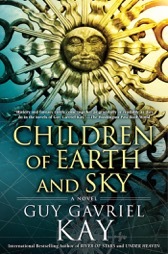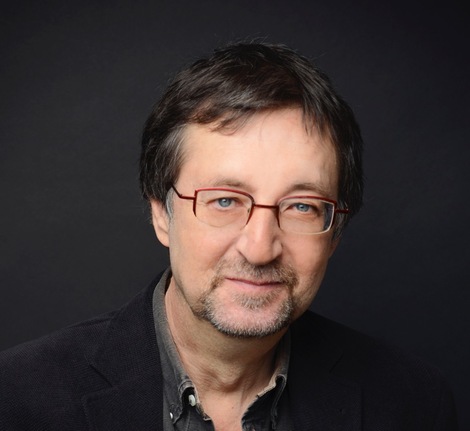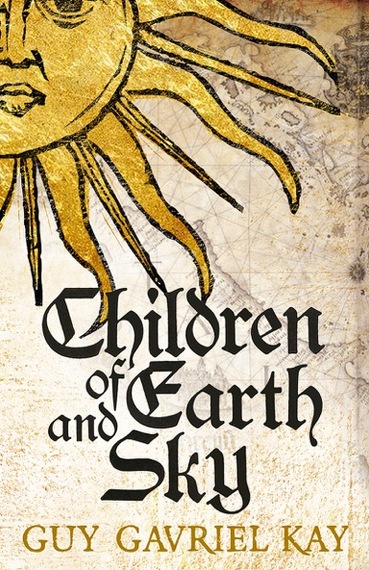A new release by fantasy master Guy Gavriel Kay is always an event. His approach, which is to explore our shared humanity through a prism of fantasy and history, is unparalleled--both in the genre and outside it. Children of Earth and Sky unfurls a world inspired by settings in fifteenth century Europe--Venice at the peak of its power, the magnificent court of Ottoman Constantinople, and the precarious mercantile center of Dubrovnik.
But the focus is on people: a portrait painter sent on a deadly mission, a young noblewoman turned spy, a female warrior in quest of revenge, a boy in search of his true name. Each is caught on relentless tides of war and politics. Through these characters and their struggles in an alternate world, Kay weaves a heartwrenching, exquisitely rendered tale that speaks to every time and place.
I caught up with Guy to talk about some of the inspirations for the novel, borderlands, ghosts, and more.
Every book has its challenges. Were there any specific to Children of Earth and Sky?
Writing them is the eternal challenge! But more precisely, in this case, I realized very early that I had a technical, craft-driven challenge of keeping the protagonists in balance. I knew this would be a book about several main characters, sometimes together, sometimes not, each trying to get on with her or his own life, as best they could, in a violent, dangerous time. That created structural issues that needed working out, in terms of - for example - how they were introduced, and when. The book couldn't 'belong' to any one of them, or that balance would be thrown off. That doesn't mean readers won't have a favorite - we almost always do! - but that should be about the reader's own interests and nature, not a failing of the author in setting up the characters and rhythm. If, for example, Danica was chapter one, there is a good chance she owns the book, and the reader.
You've said Children of Earth and Sky is about borderlands. This is true not only of its milieu, but of the characters, who are each in their own way on the interstices--often because they don't conform (which makes them especially interesting!). It seems to me that you've been on a journey to reach this point since Sarantium, when you began to explore the inner lives of people on the margins. I could easily see you setting an entire novel in the intricate, fascinating court of Asharias, but this is not that novel. Does that sound right to you--that it's been a progression among your books to reach this point? Why do you think you were drawn to this approach, that has found its culmination in Children?
Short answer: yes, I did want to set up both a literal and a psychological set of resonances for the idea of living on the 'border'. Indeed, the idea that there can be ghosts of the newly dead impacting the world (slightly?) involves figures on another kind of border, too: the transition from death to life.
Borders were usually fluid, challenged, in this setting and time, and our own inner borders are (obviously) always shifting, too. I wanted to think about people living on such borders both actual and internal.
I'm less sure the novels have been a progression, but that's me, my own sense of it. People have made that same observation about the supernatural in the books, that it is declining in a straight line, but if you look at the books, Lions had far less than, say Last Light, or Ysabel ... so I don't see any of this as a through-line, I see it as responding to the nature and needs of each book as it comes. If stronger elements of the fantastic aid the telling of that story, I'll use them, the same way I might deploy tense shifts, multiple narrators, the erotic, action scenes, detached narrator passages...it is all in the service of what I am trying to do with a given book.
In the same way, I'll resist a word like 'culmination' ... because I hope I'm not done! Having said that, yes, Children takes a theme present in earlier works - lives not at the centre of power, sometimes literally on the margins of a major set of events, and tried to give as much value and weight to them, as protagonists, as to the doings of emperors and their courts in works about the past.
You anticipated me--my next question was going to involve the supernatural. It made me think about relationships and how this relates to the theme of transience. In Children we see how people are vulnerable to the sweep of world affairs, their lives upended and destroyed. Against that backdrop, it was particularly moving to me that the supernatural involved the transcendence of bonds between people. Life is transitory, but human connection leaves a mark?
The idea of ghosts in this book started with legends/libels about the women of Senj (my quarter turn to Senjan) as being violent as their men, and also stories about them being able to access magic, variously. I also like small grace notes, connections, between books, and ghosts had been in the last two.
In this one the ghost motif gradually merged into the 'borderlands' theme of the book. So the ghosts of the newly dead are still, without making it specific (because too much explaining ends the magic, and because we do NOT understand all about the world - another motif), able to linger on that border, though not enduringly, and in all cases built around caring, or love, as you suggest. I'd love to talk about art in this book, because the sections with the artist Pero were my favorite. What were the historical inspirations for Pero's trajectory?
I'd love to talk about art in this book, because the sections with the artist Pero were my favorite. What were the historical inspirations for Pero's trajectory?
The specific historical inspiration is Gentile Bellini's journey to paint Mehmed the Conqueror (who really was keen to be painted in the western manner, and to learn about it), but nothing in Pero's nature, his life, or his journey have any more precise link to the real one. Nor is his painting in the east similar. He gained complexity, which often happens for me, as he grew to surprise himself.
Your books are in many different languages (25 or 30 at last count?) and countries. How does it feel when you deal with publishers and readers in widely varied cultures?
There's a lot to say on this, we could go a long time on it. But I'll make one comment. I find the foreign language editions, and readers deeply and wonderfully reassuring, and here's what I mean by that...
There are so many things that can divide us. Nationality, religion, gender, generation, politics, class, just as quick examples. But when I am in touch with readers (either in person, or by mail, or just online) from countries from Korea to Brazil, China to Mexico, what comes through is how art and literature can not only link us, they show the links that are already there. The questions I'm asked, the responses to characters and scenes in the different novels ... they can be astonishingly, wonderfully the same. People are moved or engaged by the same sorts of things. The erasing of identity in Tigana, the loss of a world and of individual possibilities when a holy war begins in Lions, the destruction of art in the Mosaic, character deaths all though (I do that, yes)...
I find this, far beyond my own books, to say something inspiring about human nature. Some of my greatest pleasures as a writer have come from these interactions.
Photo credit: Samantha Kidd
Guy Gavriel Kay is the author of thirteen novels (most recently Children of Earth and Sky), and a book of poetry. He has written book reviews and social and political commentary for the National Post and the Globe and Mail, the Washington Post and The Guardian, among others. Translations of his fiction exceed twenty-five languages and his books have appeared on bestseller lists in many countries. Kay has spoken and read on behalf of his publishers and at literary events around the world. He was been nominated for and has won numerous literary awards and is the recipient of the International Goliardos Prize for his contributions to the literature of the fantastic. In 2014 he was named to the Order of Canada, the country's highest civilian honour.
*
Ilana Teitelbaum's writing has appeared in the Globe and Mail, the Los Angeles Review of Books, and Salon. Her epic fantasy debut, Last Song Before Night, was published in October 2015 by Tor/Macmillan under the pen name Ilana C. Myer.

